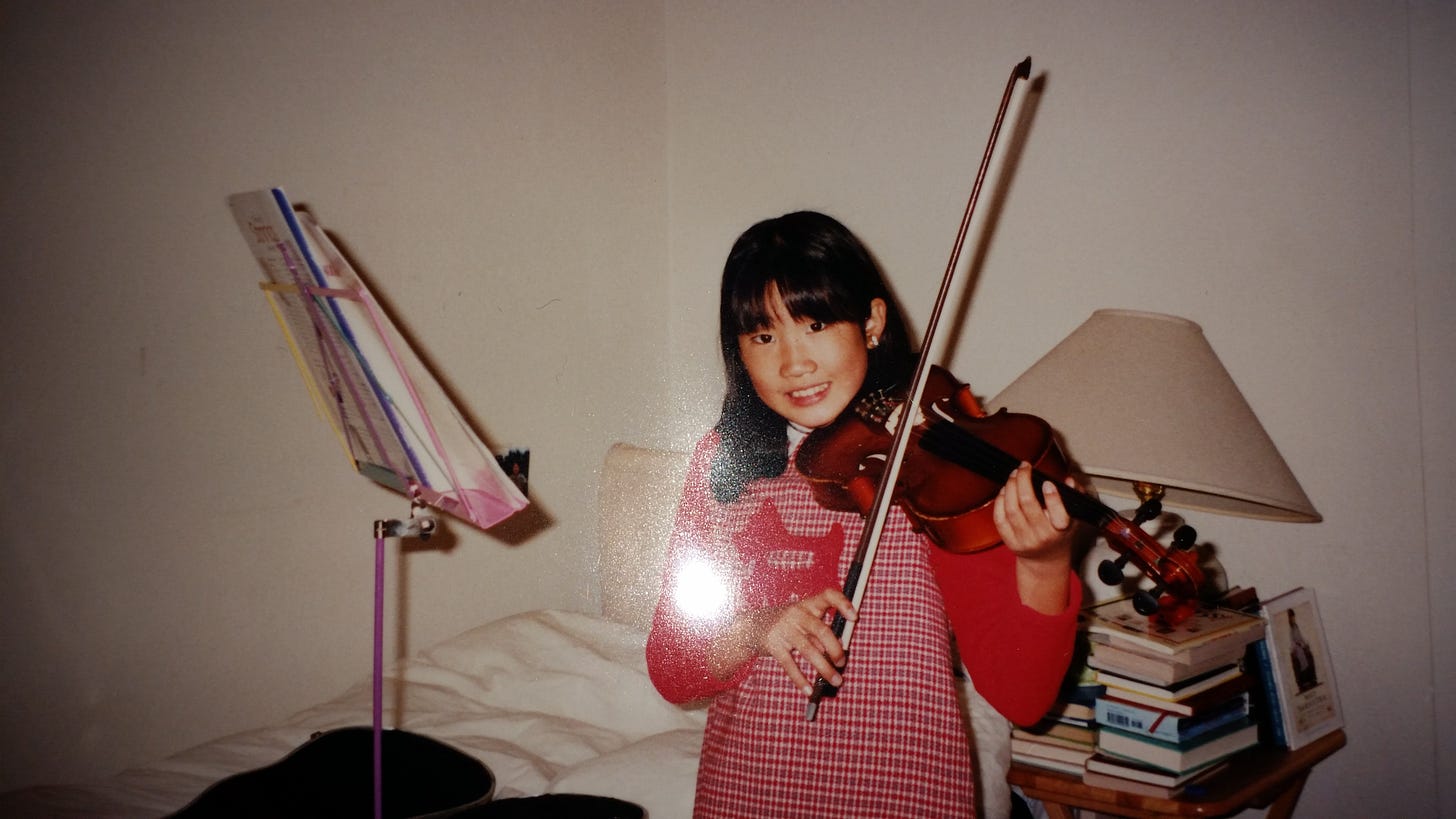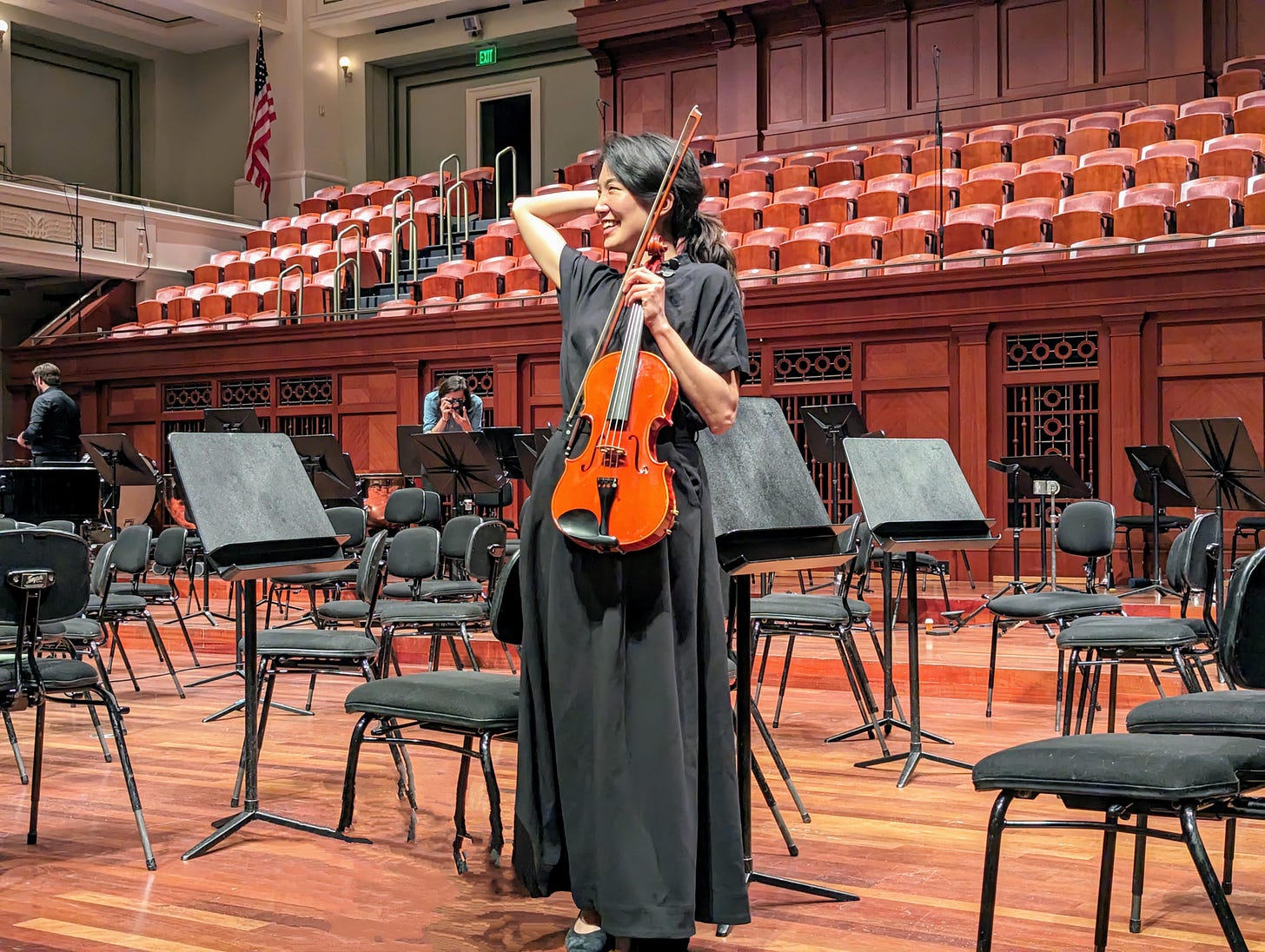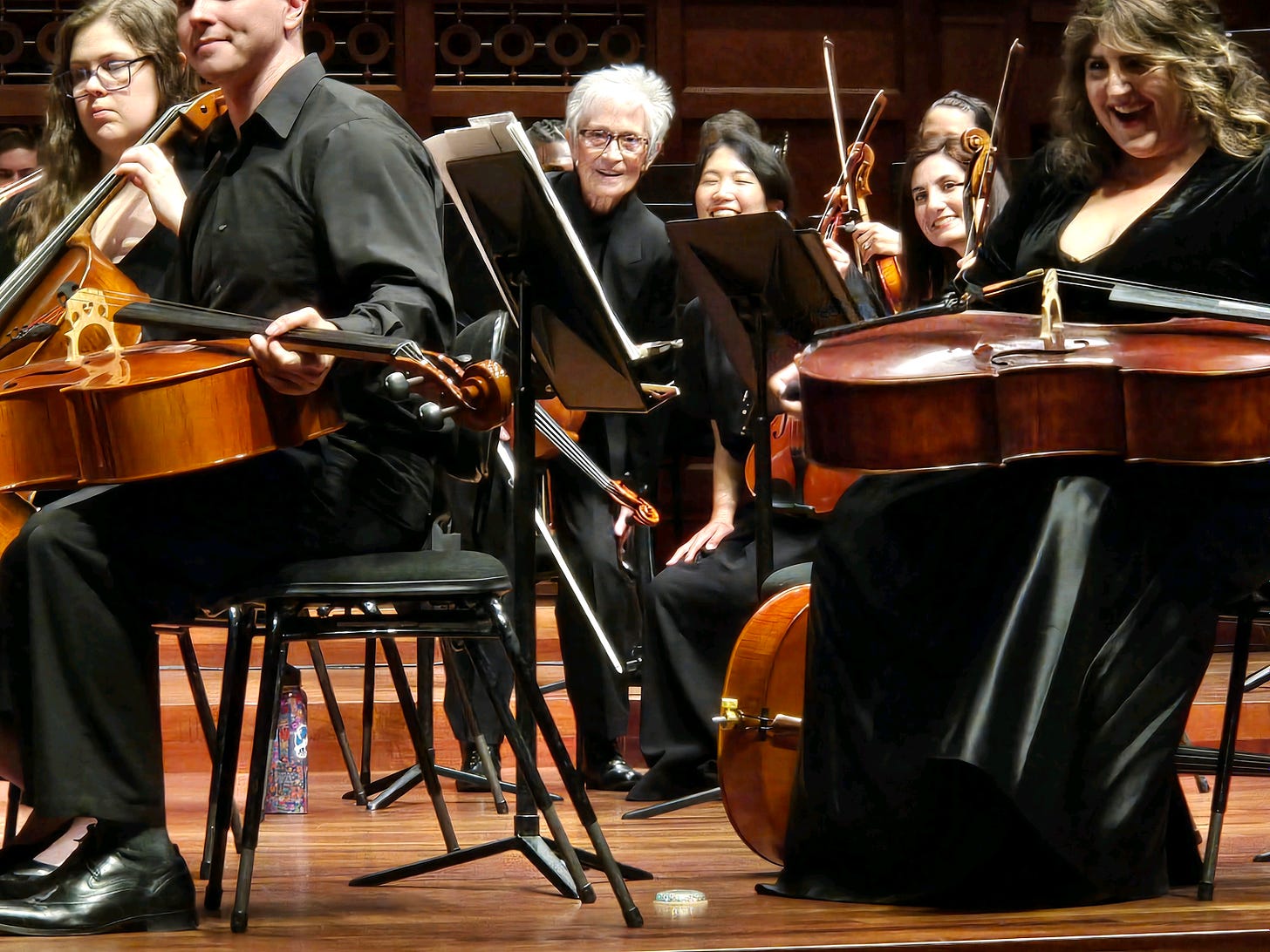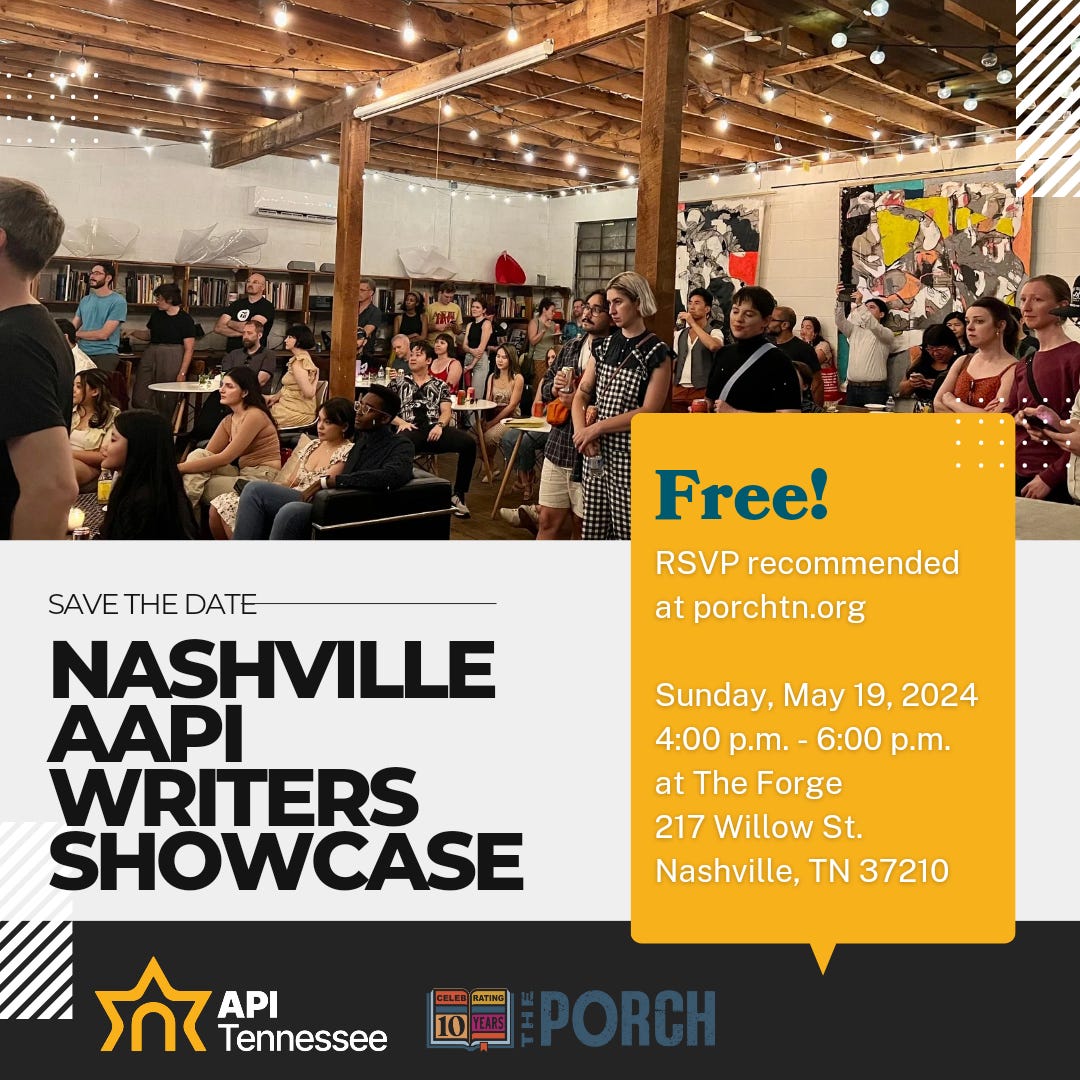I’ve written about playing the viola before—how I decided on the instrument at ten years old, my miraculous encounter with my viola teacher in Tokyo who would forever change the way I understand the evolution of emotions, and my choice to play the same Bach suite year after year.
What I didn’t mention, and what’s still painful for me to admit to people today, is how much I had once wanted to become a professional violist and make a living as a member of a professional orchestra or quartet. How close it felt that one summer (between junior and senior year) when I practiced eight hours a day and almost mastered the Max Reger Viola Suite in G Minor, a difficult, modern piece that I could potentially use in audition tapes.
The limitations were clear. Most professionals start playing at a much younger age. My muscles were too hardened in some places, too soft in others. I had a weird way of holding the bow. (I’ve never even held a pencil or chopsticks correctly, which might be related.) When I shifted my fingerings, the tuning was inconsistent since I had failed to practice my scales and etudes like I was supposed to.
When applying to colleges, I limited myself to schools that had strong music programs and orchestras in place. I wasn’t good enough for the traditional music conservatories, but I figured I could still work on my passion and technique at my own pace. I had already given up, in a way, at this point—but the hope was still there. I would still carry my viola around everywhere. My friends would come to learn that this viola was named Antonio, after the famous instrument maker Antonio Stradivari.

It wasn’t until I hit my 20s that the dream of becoming a violist really started to drift away into a fantasy, just like the possibility I once held of working at the UN or becoming a professor who only taught Plato’s Dialogues (and nothing else). I had to come to terms with the things I wasn’t good at, the things I didn’t want to do, the things I happened to be good at, and the things I was willing to learn. Gradually, I found my way towards creative writing, a world I’ve inhabited for a decade through publications, work experience, awards, et cetera. And yet I still can’t shake the feeling that this, too, will turn out like my pursuit of the viola, and that one day, I’ll hit a wall of limitations that I can’t break down.
The thing that keeps me going whenever I feel this way is to remember how I feel when I do play the viola—as an amateur. Another thing I’ll admit here is that my technique has deteriorated abysmally compared to how I was at 17. With a full-time job, two kids, and multiple novels-in-progress, I hardly have any time to practice. But none of that matters when I sit in the 9th chair of the viola section of the Nashville Philharmonic, the community orchestra that I’ve been a part of, on and off, for the last six years. There are a handful of professionals and some extremely talented amateurs, but there are also a lot of people with a similar story as mine, who aren’t necessarily proud of their skills, but still hold onto a tiny part of that dream, that catharsis of playing something beautiful for an audience and being able to say: I did it.
The orchestra recently concluded its 20th season with an ambitious program, ending with Beethoven’s Ninth Symphony, a piece that is so recognizable yet one of the hardest things I have ever played. Like a child, I counted with my mouth (“one, two, one-two-three, one-two-three”) and still somehow lost my place in the music, succumbing to the amateur’s well-practiced art of “air bowing” (which works when the viola section is as robust as ours). Before our last concert at the Schermerhorn Symphony Center, I had the principal violist tune my instrument for me because I couldn’t rely on my own hearing. I was sweating all over, terrified of being the reason we sounded anything but beautiful.
What ended up happening is what typically happens at every Nashville Philharmonic concert—somehow, we came together. The little mistakes went unnoticed by the audience, and we stood and bowed in triumph. To play Beethoven’s Ninth with a full chorus (with the group, Nashville in Harmony, no less) in a professional concert hall, in itself was a once-in-a-lifetime experience that I’ll cherish forever. Fresh from the performance, I can still recall my own mistakes, but I anticipate that in a year, I’ll listen to my husband’s recording from his phone and remember it as the time a bunch of amateurs did their very best and pulled off a feat.
Looking at my own novel manuscript which has gone through multiple revisions, I can say that it is currently as complete, coherent, and cohesive as it can be. There are still thorns that stick out here and there, parts that I know will need more editing and perhaps even some radical shifting. It still feels far from a real book, and it won’t feel that way until it actually gets published, if ever. But this version is the best I can do right now, and I think it’s finally time I send it to my agent and see what happens.
It’s hard to look at this manuscript and accept that this is my best, because I’ll always be a perfectionist and aspire for the thing I write to be better, somehow. But if I really were a perfectionist, I wouldn’t have joined the Nashville Philharmonic out of a fear of missing those notes. I’m glad that I put my imperfect violist self out there, not just for the music but the real connections I’ve made with my fellow amateurs around me. Wherever they’re at with their professional, personal, and musical journeys, I was proud to stand there with them, pat each other on the back, and say: We did it.
Happy Asian American, Native Hawaiian, and Pacific Islanders Heritage Month! I’m happy to announce that the Nashville AAPI Writers, a group I founded a couple years ago, is having its second public showcase on Sunday, May 19, 4-6pm at The Forge. I hope you can all make it and witness the vibrancy and diversity of this incredible community. Featuring: Cortney Warner as Emcee, and poetry and prose by JR Robles, James Kyson, Jenny Zheng, Sarong Vit-Kory, Josh Inocalla, Evelyn So, Ben Tran, Kanak Kapur, and Steve Haruch. Free to attend! RSVP here. If you’re unable, please consider donating $5 here to help us continue these meetups and events.






so beautifully written Yurina! i resonate with this deeply <3
I love when you write about the fusing of writing and classical music. That’s my life too with the opposite ratio.